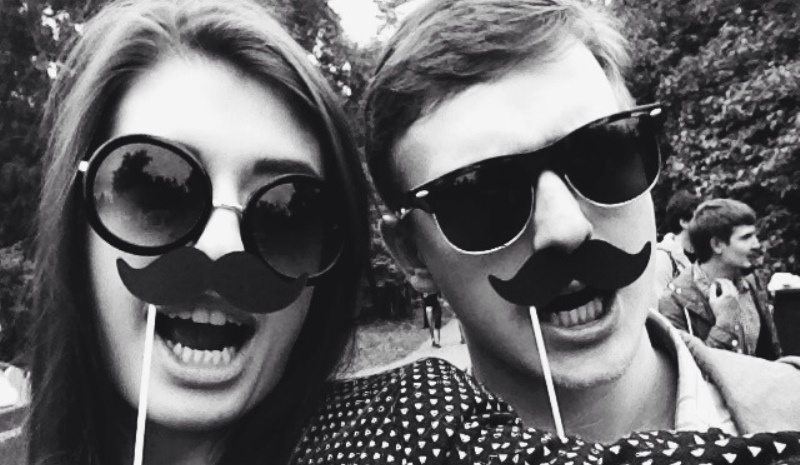Whilst social media was still groaning under the weight of selfies, guess who makes a grand entry – Relfie, Selfie’s even-more-abhorrent, repugnant, and redundant twin!!
Relfie is the new hate-worthy twin of selfie, equally detestable and distasteful as those duck-face selfies that attack social media servers every ten seconds, in hordes. Actually, relfie is doubly execrable and repellant, coz hey, you double the humans, you double the hate!! Now, now, before you dismiss me as a cynical netizen, who cannot stand ‘socializing,’ let me tell you this:
Suggested read: Is Facebook ruining your relationship?
This isn’t all me!! This is the conclusion drawn from a recent study published in the journal Personal Relationships by the team behind Science Of Relationships. More on this later.
First, what (or should we ask who) exactly is Relfie?
Image source: Google, copyright-free image under Creative Commons License
Relfie is a relationship selfie or when you take a selfie that includes a relationship partner or someone else you are close to (like a parent and child). Relfies are those pictures that people take when they turn their cameras on themselves to show off their relationships that are then posted on social networking sites like Facebook, Tumblr, and Twitter. (Science Of Relationships)
Why do people take one or two or ten (or aaaarrrgghhh-more!!)?
To document their lives, especially their relationships and publicly display their satisfaction with their relationship. After all archiving close moments with ‘ohh-spent-four-hours-coming-up-with-an-‘awesome-caption’ isn’t quite child’s play!
The PROBLEM
If only Bradley’s arm was longer. Best photo ever. #oscars pic.twitter.com/C9U5NOtGap
— Ellen DeGeneres (@TheEllenShow) March 3, 2014
If Ellen DeGeneres can break the internet with her selfie (or is it relfie? There are, after all, so many loved faces in there) and she says it is the best selfie ever (could be better if Cooper’s arm were longer!), can’t we just believe the ever-charming and witty lady? I mean, selfie is as much a form of self-documentation via one’s own image, or one with a pet dog, a recent crush, a friend or even a group of duckfaces!! Then, WHAT is the need for this unnecessary and redundant progeny of Internet phenomenon, Relfie, when its elder sibling serves just as well?
Suggested read: 8 tips to use Facebook appropriately while dating someone
Coming back, The RESEARCH
Science of Relationships wanted to investigate what a relfie and other correlated relationship information provided on social media says about one’s relationship. Their research team also wanted to account for other people’s reactions to such information. They sought answers to two specific questions about the relfie phenomenon:
1. If you are satisfied with your relationship, can others tell based on what you’ve posted on Facebook?
2. Do we like people who post about their relationships on Facebook?
In the first study, more than 200 participants in romantic relationships completed questionnaires about their relationship quality (e.g., satisfaction and commitment) and provided the research team with access to their Facebook profiles. The coders (members of the research team who did not know what the participants actually said about their relationships and didn’t know the hypotheses of the study), then collected information from those profiles including whether participants had a “dyadic profile picture” (i.e., a relfie or similar picture that included both the individual and his or her partner) and if their relationship status indicated that they were “in a relationship…” (i.e., a “dyadic relationship status”). More than 25% of the participants (who were all in romantic relationships) had a dyadic profile picture and nearly 70% had a dyadic relationship status on Facebook.
The coding team was then asked to glean the relationship quality based on the information in the Facebook profiles. Participants with relfies and dyadic relationship statuses were adjudged to have higher satisfaction with their relationships. This perception about the relationship quality was found to have a strong correlation with the participants’ answers on the questionnaires. Thereby, the research team concluded that “viewers can glean your relationship quality relatively accurately from what you post about your relationship on Facebook, and they perceive your relationship as better when you have a dyadic profile picture (like a relfie) and dyadic relationship status.”
Image source: Google, copyright-free image under Creative Commons License
In the second study, the researchers created fake Facebook profiles and varied the profiles, in terms of uploading dyadic relfies or dyadic relationship statuses. They also included status updates for each profile that had varying levels of relationship disclosure. For example: “Pining away for Jordan … I just love you so much I can’t stand it!” (high relationship disclosure, which involves sharing personal details about one’s relationships); “I love my girlfriend” (low relationship disclosure) and “phoneless for a bit, email me” (no relationship disclosure). Again, the study proved that there was a positive correlation between relationship disclosure and the perception of relationship quality.
Suggested read: How to make your online dating profile stand out – the scientific way!
However, it was also found that the perceptions of higher relationship satisfaction and commitment, so associated with dyadic pictures and statuses and higher levels of relationship disclosure, were also directly proportionate to the ‘dislikeability’ factor. The more a couple goes lovey-dovey on their social media profiles, the higher the viewers’ perceptions about their relationship quality and the lesser the couple’s likeability. Thus, the take home message that the study established is, “others will assume you are in a good relationship if you post relfies, change your status to ‘in a relationship with…,’ and talk about your relationship on Facebook. In addition, people viewing your profile are pretty accurate in their ratings of your relationship. If you are in a strong relationship, viewers can pick that up from your Facebook profile. However, there is some danger in getting too schmoopie about your relationship on Facebook; although your friends will think your relationship is going well, they will like you less.”
Image source: Google, copyright-free image under Creative Commons License
So, I guess we have all learnt that we should be wary of being ‘too happy,’ at least on social media. Relfie is a scourge and does ‘the happy’ wrong. There is an implicit danger involved in splattering your profile with these tokens of ‘happy love’ – that of being hated by others, who may have, at one point or another, loved you!! So, keep that relfie train in check – let your love and laughter be etched in memories and keep those shutterbug captures in your own locked storage devices!
After all, the whole point of ‘socializing’ is to be LIKED! Isn’t it? (Okay, okay, I could write a whole rhetorical article on this too, some other time). As of now, don’t ‘schmoop’ your likeability by a relfie-xcess is all I have to say.
After all, I know you crib about those show-offish ‘schmoop’ people with overtly happy duckface relfies too! We all know it’s puke-inducing and too much of the mush-dish leaves us with an upset stomach. Don’t cook it yourself!!! You might end up giving food poison to all your friends!
Featured image source: Google, copyright-free image under Creative Commons License
















